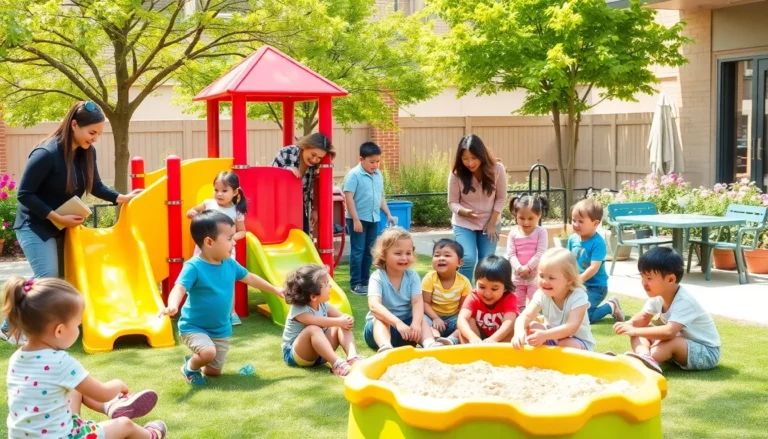In a world filled with challenges, problem-solving activities are the secret sauce to unleashing creativity and sharpening minds. Whether it’s a puzzling conundrum at work or a tricky riddle at home, these activities transform frustration into fun. Who knew tackling a problem could feel like a game of chess instead of a game of whack-a-mole?
Table of Contents
ToggleOverview of Problem-Solving Activities
Problem-solving activities focus on developing critical thinking skills. Engaging in these exercises enhances analytical abilities and promotes innovative thinking. Examples of these activities range from puzzles to team challenges, each offering unique benefits.
Many organizations utilize problem-solving activities in team-building sessions. Teams participating in these activities improve collaboration and communication. Real-life scenarios, like case studies, present opportunities for staff to practice decision-making. Structured activities, such as escape rooms, encourage participants to strategize under pressure.
Research indicates that frequent participation in problem-solving exercises supports cognitive growth. Cognitive challenges boost memory function and information retention. These activities can also reduce stress, as they shift focus from negative emotions to constructive thinking.
Diverse formats exist for problem-solving activities. Individual tasks motivate self-reflection and independent thinking. Group activities cultivate teamwork and allow multiple perspectives to emerge. Virtual options, such as online brainstorming sessions, enable global collaboration.
With technology’s rise, many software tools facilitate problem-solving engagement. Various platforms provide simulations and gamified experiences that enhance learning. Interactive elements encourage user participation, making learning enjoyable and effective.
Implementing problem-solving activities into daily routines proves advantageous across various settings. Workplaces benefit, as innovative solutions often arise from collaborative efforts. Educational environments thrive, as students adopt a proactive approach to tackling challenges. By incorporating these practices, individuals and teams consistently improve their problem-solving abilities.
Benefits of Engaging in Problem-Solving Activities

Engaging in problem-solving activities yields numerous cognitive and social benefits. These activities enhance critical skills necessary for personal and professional growth, directly impacting overall effectiveness.
Cognitive Development
Cognitive development significantly improves through problem-solving activities. Individuals enhance critical thinking and analytical skills by tackling complex tasks. Research shows that these exercises promote memory retention and increase information processing speed. Skills such as pattern recognition and logical reasoning further emerge during these activities. Regular participation in puzzles or strategic games enhances creative thinking, opening doors to innovative solutions. Challenging interactions in team settings foster adaptability to diverse perspectives, enriching cognitive resilience. Educational environments, particularly, benefit from adopting problem-solving frameworks, enabling students to approach challenges proactively.
Social Skills Enhancement
Social skills enhancement results from engaging in problem-solving activities. Team-based challenges encourage collaboration and communication, proving essential in both personal and professional contexts. Participants develop interpersonal skills, gaining confidence as they share ideas and resolve conflicts. Group dynamics foster empathy, helping individuals to appreciate diverse viewpoints. These activities often lead to stronger relationships, as teamwork creates a sense of community. In workplace settings, improved social interaction translates to better team performance and innovation. Overall, engaging in these problem-solving exercises cultivates a supportive environment for personal growth and collective achievement.
Types of Problem-Solving Activities
Variety exists in how problem-solving activities can be structured, enhancing both individual and group experiences. Below are examples of two main categories.
Individual Activities
Individual activities focus on enhancing personal skills and self-reflection. Puzzles, such as crosswords or Sudoku, stimulate cognitive function and critical thinking. These tasks require concentration and strategic planning. Reflection exercises encourage individuals to analyze their approaches and refine their strategies. Chess and other strategy games foster decision-making abilities and patience. Engaging in solo challenges strengthens resilience by promoting a sense of accomplishment when solving complex problems. Additionally, journaling allows for exploration of thoughts and ideas, leading to better clarity and problem-solving insight.
Group Activities
Group activities emphasize collaboration and teamwork, allowing individuals to gain insights from multiple perspectives. Team challenges, like escape rooms, develop communication skills under pressure while enhancing critical thinking. Group brainstorming sessions generate diverse solutions to problems and create a dynamic atmosphere for idea generation. Real-life case studies facilitate team discussions and simulate decision-making scenarios. Participating in these activities builds trust and camaraderie among team members. Collaborative games, such as cooperative board games, require working together towards a common goal, strengthening team bonds and improving problem-solving capabilities. Regular involvement in group exercises cultivates a proactive approach to challenges, reinforcing shared understanding and unity.
How to Implement Problem-Solving Activities
Implementing problem-solving activities enhances creativity and critical thinking skills. These activities thrive in various environments, including educational settings and homes.
In Educational Settings
Educators can incorporate problem-solving activities through interactive projects and group discussions. Group projects encourage collaboration while fostering innovation among students. Puzzles enhance individual cognitive skills, promoting self-reflection and resilience. Teachers may utilize case studies relevant to the curriculum, allowing students to practice real-world decision-making. Engaging students through simulations and role-playing exercises helps them understand complex concepts. Integrating technology with problem-solving games further amplifies interest, making learning enjoyable and effective. Prioritizing these activities cultivates an engaging classroom environment that nurtures problem-solving abilities.
At Home
Families can introduce problem-solving activities to promote bonding and communication. Board games serve as effective tools for developing critical thinking and strategizing skills. Cooking together involves following recipes, which requires planning and adaptation when ingredients vary. Puzzles available in various formats invite creative thinking and patience. Parents can encourage children to tackle everyday challenges, such as organizing their rooms or completing school projects, fostering independence. Providing opportunities for family discussions on problem-solving approaches instills a proactive mindset. Structuring home life around these activities supports cognitive and emotional development for all family members.
Embracing problem-solving activities can significantly enhance cognitive skills while fostering a collaborative spirit. These engaging exercises not only develop critical thinking and creativity but also create opportunities for teamwork and communication. By integrating these activities into daily routines at home and in educational settings, individuals can cultivate an environment that encourages innovation and resilience.
Whether through individual puzzles or group challenges, the benefits are clear. Participants gain valuable insights and learn to navigate complex situations with confidence. Prioritizing problem-solving activities is a proactive step toward personal and professional growth, paving the way for effective solutions in any challenge faced.




